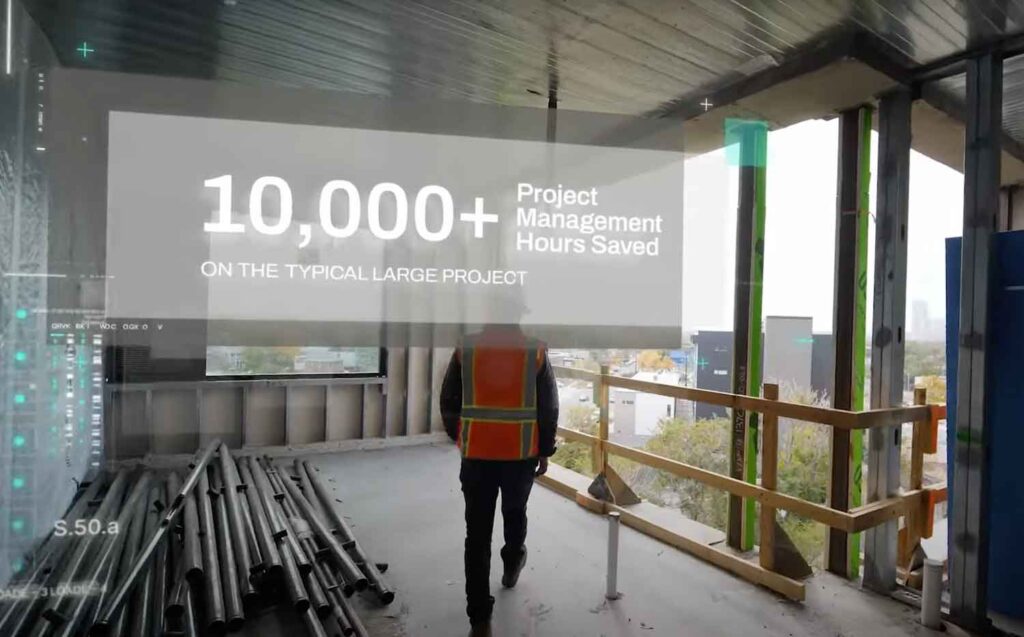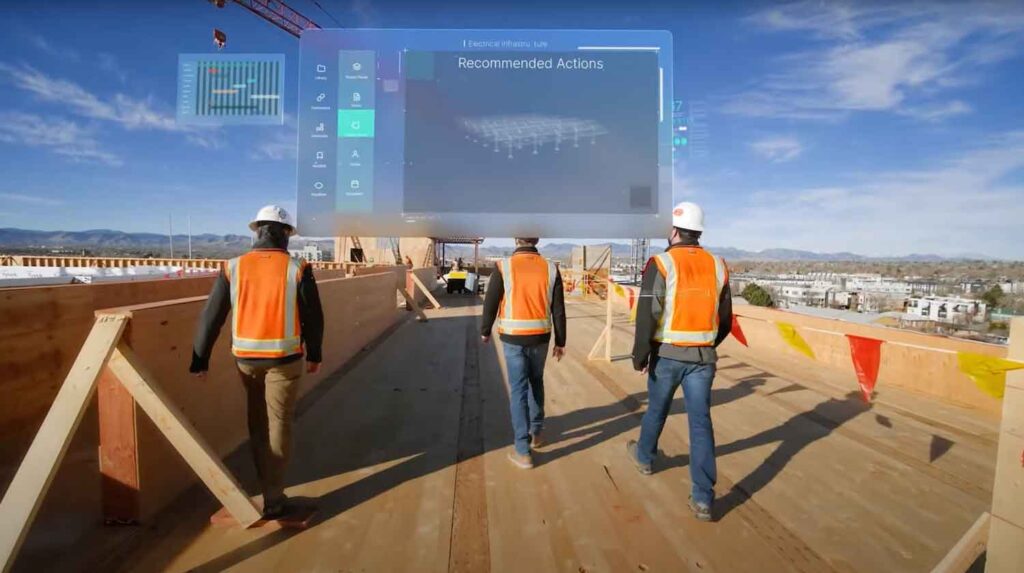Today’s Construction Challenges: Unused Data & Poor Communication
The construction industry has seen a remarkable increase in the availability of data and construction management software tools. Yet, data alone is meaningless if it’s not properly sourced, aggregated, and analyzed, a common issue across construction projects of all sizes. AI-driven construction project management doesn’t mean the humans are being replaced. Rather, it is taking a tool that collects data and giving it the ability to connect dots and predict outcomes humans may not have time to track down.
A joint study by Autodesk and FMI Consulting uncovered the staggering impact of poor data practices on global construction projects. Bad data costs the construction industry $1.8 trillion annually. Avoidable rework alone accounts for $88 billion in expenses.
Bad data costs the construction industry $1.8 trillion annually.
Autodesk and FMI Consulting
The study defined “bad data” as incomplete, inaccurate, inconsistent, or outdated information. While 55% of 3,900 surveyed construction professionals claimed to have a formal data strategy, 30% admitted that over half of their data was unreliable. Even more concerning, 95% of construction data goes unused, leaving valuable insights untapped.
To put this into perspective, neuroscience researcher Barry Gordon and John Henley have demonstrated that nearly every part of the human brain is active over a 24-hour period, even during sleep, featured in Scientific American. Imagine operating with just 5% of your brain power. Decision-making would suffer, opportunities would be missed, and potential would shrink.
The same applies to construction. Using only 5% of available data means flying blind, lacking insights and recommendations into what drives success or causes delays, rework, and costly mistakes.

The problem isn’t a lack of data, it’s the overwhelming volume without proper oversight. Construction sites generate massive amounts of information, but data alone doesn’t translate into actionable insights.
Most construction data remains static—uploaded, ignored, and forgotten. Data analysts are rarely part of the core team, leaving valuable information underutilized. Without active engagement and analysis, the promise of data-driven project management remains unrealized.
So why do companies still struggle to get their data right?
Challenges in Transforming Data into Actionable Construction Insights with AI-driven Construction Project Management
Accurate, timely, and relevant data is essential in construction, but clean data alone doesn’t guarantee better outcomes. Without proper aggregation and analysis, critical issues remain hidden. By leveraging tools like AI-driven construction project management to collect and aggregate data, predictive data can signal costly mistakes and rework can be avoided.
A major challenge is consolidating internal and external data into a single, accurate system. Most global projects use only 5% of available data, making it difficult to identify what truly matters. Data also evolves and requires constant updates to reflect real-time conditions. Outdated information leads to costly, misaligned decisions.
Another issue is scattered data across platforms like Autodesk, Procore, and Fieldwire. Even accurate data becomes ineffective when siloed. A unified system enables teams to extract meaningful insights, but expertise in data management is often lacking, making integration a challenge.
The true value lies in connecting data sources to generate proactive insights and recommendations for construction projects. Using tools that incorporate an ai-driven construction project management software helps to bring overlooked data to light. Teams that anticipate delays, weather impacts, or overlooked issues can course-correct before disruptions occur. Predictive insights reduce costly rework and keep projects on schedule.
Manual data management is no longer feasible for large-scale projects. Companies that successfully transform data into actionable insights gain a competitive edge, avoiding inefficiencies that drain resources. With trillions of dollars on the line, can construction giants afford to fall behind?
The Impact of AI in Construction: The Three Pillars of Data Success
Managing construction data is overwhelming. Teams must filter, organize, and consolidate real-time data into a single source of truth. Generating proactive insights and recommendations for construction projects adds complexity, often surpassing human limits.

The solution isn’t hiring more people, it’s optimizing resources. AI streamlines data management by identifying key datasets, ensuring updates, and centralizing information. It connects external data, team interactions, and project notes to provide a real-time, comprehensive view.
The three pillars of AI-powered, data-driven construction success:
- Identify and Capture Dynamic Data Sources
AI construction intelligence platforms empower teams to integrate internal and external data while keeping it up to date. This ensures a strong foundation for generating actionable insights.
However, real optimization comes from combining AI with human expertise. AI identifies patterns and trends at scale, processing vast amounts of information instantly. Human insight, on the other hand, provides the necessary context for how systems interact and influence project outcomes.
By leveraging both, teams can minimize human error and distractions. AI automates data collection and analysis, allowing professionals to focus on high-impact decisions rather than the logistics of managing information.
- Organize Vast Data Sets & Automate Tasks
Generative AI automates data import, aggregation, and organization into a single source of truth. This minimizes human errors, saves time, and ensures real-time updates.
Advanced AI solutions also handle repetitive tasks, reducing the number of moving parts project teams must monitor. By simplifying data management, AI streamlines operations and improves efficiency.
For large-scale projects requiring extensive manpower and coordination, reducing complexity is essential. AI helps teams stay organized, focused, and in control.
- Identify Key Issues & Auto-Alert the Team
Agentic AI is revolutionizing construction by automating data analysis and decision-making. AI agents handle specific tasks, continuously learning and adapting to improve efficiency.
These agents analyze data holistically, connect insights, and refine their understanding with each task. Over time, they become more effective and enhance their ability to predict future outcomes with greater accuracy.
They function like a hyper-intelligent team of data analysts, working faster than humans, https://34.229.72.234/how-it-works/eliminating errors, and operating seamlessly in the background until their tasks are complete.
AI-powered construction software integrates seamlessly into your tech ecosystem, enhancing project management and efficiency. It automates data management, monitors schedules, detects risks, and continuously improves through machine learning.
By applying AI across projects, teams gain insights from past work, refine success factors, and reduce errors. This ensures smarter decision-making and keeps projects on schedule.
Transforming Construction Projects: Net-New Insights Generated by Agentic AI
Having a scalable group of AI agents that are goal-directed and work in the background for the construction project management team may sound abstract at first glance. Let’s break this concept down with four real-life examples that are already in use today.
How Insights from AI-driven Construction Project Management Software is Used:
- Weather Tracking & Construction Schedule Alignment
Many construction tasks rely on external conditions, but project managers can’t monitor every variable affecting timelines. Beyond weather, factors like political instability, logistical disruptions, and traffic can also cause delays.
AI-driven construction project management software consists of data sets and AI agents that track these variables in real time, sending alerts when conditions threaten schedules. By identifying risks, whether from an incoming storm or a supply chain issue, AI helps teams make informed decisions, minimizing disruptions and reducing costly delays.
- Automated Form Delays & Schedule Adjustments
Delays are unavoidable in construction. AI agents track and document them in real time, removing the need for manual updates.
This frees up project managers’ time while ensuring all delay-related data is captured, analyzed, and properly recorded.
- Continuous Schedule Integrity Monitoring
AI agents enhance efficiency by continuously monitoring schedule integrity. Assigning an agent to oversee a project ensures immediate alerts when tasks deviate from the timeline.
By analyzing data points and dependencies, AI sends push notifications on potential disruptions. This allows teams to address issues before they escalate.
- Analyzing Project Data & Providing Lessons Learned
In construction, teams often move from one project to the next without time for debriefs or lessons learned. AI agents help by identifying concerns, calculating impacts, and alerting stakeholders with corrective actions.
They also learn from human errors, improving future decisions. For example, after repeated delays from incorrect material orders, AI might recommend clarifying insulation specifications with vendors.
By analyzing past mistakes, AI helps teams avoid future issues, leading to consistently better project outcomes.
Agentic AI transforms construction project management by enabling data-driven decisions, automating repetitive tasks, and continuously improving through machine learning.
Beyond optimizing project outcomes, AI fosters accountability and continuous improvement. It tracks successes and failures, ensuring every decision is recorded and indisputable.
Case Study: AI Enhances Project Status & Quality for $500M Hospital Project
A tier-1 general contractor in Canada faced major challenges during a $500M hospital project, managing over 1,000 open issues at any time. Disaggregated data, reactive issue management, and limited productivity insights slowed progress and increased risk. With data spread across BIM 360, Procore, and proprietary software, prioritizing and resolving critical issues that integrate with construction technology tools and software became difficult.
To address these issues, the contractor partnered with Slate Technologies. Slate centralized project data, providing real-time visibility into quality control processes within BIM. With tools like Slate Predictive AI and Slate Visualize, the team automated quality reporting, identified recurring issues, and extracted actionable insights. This helped teams proactively manage risks, optimize workflows, and improve collaboration.
The impact was significant. The project saved $676,000, reduced project management hours by 10,000, and was 50% less likely to exceed budget or timelines. Slate’s tools also cut rework by 60%, increased accountability, and improved overall project quality.
The project saved $676,000, reduced project management hours by 10,000, and was 50% less likely to exceed budget or timelines.
AI Insights Case Study for $500 Million Construction Project by Slate.ai
Slate’s tools cut rework by 60%.
By integrating AI at every stage, Slate helped move beyond reactive project management. Its solutions surfaced hidden issues, assessed risks, and provided predictive recommendations, keeping projects on track and teams empowered.
Read the entire case study here: AI Insights Case Study for $500 Million Construction Project by Slate.ai
The Shift to AI & Machine Learning-Enabled Construction Project Management
The construction industry is growing more complex. Managing the massive data from large projects is overwhelming.
As Warren Buffett said, “If you don’t find a way to make money while you sleep, you will work until you die.” The same applies to data. If it doesn’t work for you around the clock, your projects will always struggle with delays.

The World Economic Forum names artificial intelligence as a key driver to modernize construction. The latest construction project management software solutions overcome barriers such as financial constraints, lack of skilled labor, and slow technology adoption. AI-powered tools offer low-cost, high-return opportunities, making them indispensable.
Technology is transforming construction. AI and machine learning help teams fully leverage their data, eliminating interpretation issues and automating repetitive tasks.
Real-time monitoring improves efficiency, cuts costs, and keeps projects on track. With fewer delays, firms, teams, vendors, and customers all benefit.
The Future of AI in Construction: Smarter, More Profitable Projects
The construction industry is at a turning point. With AI-powered construction management software, companies can move beyond outdated, reactive processes and embrace data-driven decision-making that increases efficiency, profitability, and project success. By harnessing AI and machine learning, firms can eliminate costly rework, improve collaboration, and unlock real-time insights that keep projects on schedule and within budget.
As technology continues to evolve, early adopters of AI-driven construction solutions will gain a significant competitive edge. The question is no longer whether the industry will adopt AI, but which firms will leverage it first to lead the future of construction.
The construction industry struggles with underutilized data, poor communication, and costly inefficiencies—leading to $1.8 trillion in annual losses. Traditional construction management software fails to transform raw data into actionable insights, leaving teams reactive instead of proactive.
AI in construction is revolutionizing the industry by automating data analysis, predicting risks, and optimizing project workflows. With machine learning and predictive analytics, firms can reduce rework, enhance decision-making, and maximize profitability. AI-powered tools like Slate Technologies help general contractors and real estate investors streamline operations, improve project visibility, and stay on schedule and within budget.
The future of construction efficiency is data-driven and AI-powered—those who adopt smart construction technology today will lead the industry tomorrow.
About Slate Technologies
Slate Technologies provides AI solutions for real estate and construction, delivering industry-specific, data-driven insights.
For real estate, its platform equips investors and developers with tools for market analysis, risk assessment, and forecasting. AI helps identify opportunities and optimize investment strategies with precision.
In construction, Slate’s digital assistant enhances project management by improving cost control, boosting productivity, and ensuring schedule reliability. It provides dynamic decision support throughout the project lifecycle.
Backed by top software engineers and industry experts, Slate is transforming both industries with AI-driven intelligence.
——————————————————————————————————————-
Sources
https://34.229.72.234/insights-recommendations/
https://www.msuite.com/bad-construction-data-costs-industry-1-8-trillion-worldwide/
https://www.scientificamerican.com/article/do-people-only-use-10-percent-of-their-brains
https://slate.ai/wp-content/uploads/2025/01/Slate-Insights-Case-Study.pdf
https://www.weforum.org/stories/2023/06/4-ways-ai-is-revolutionising-the-construction-industry
——————————————————————————————————————-

